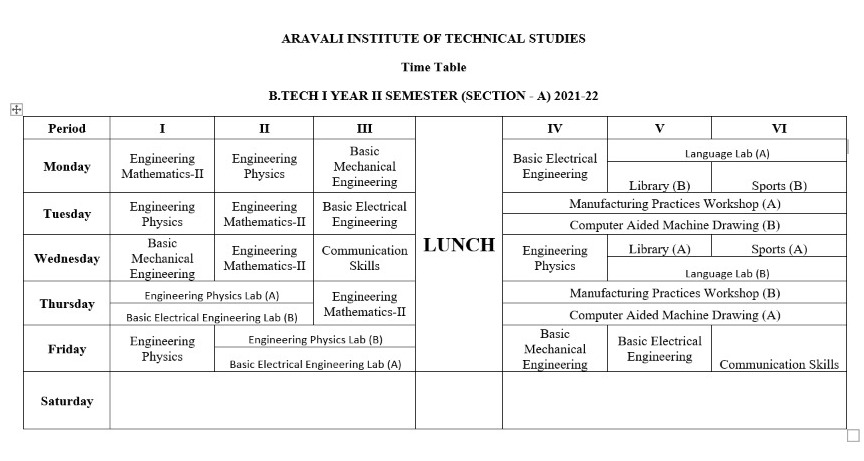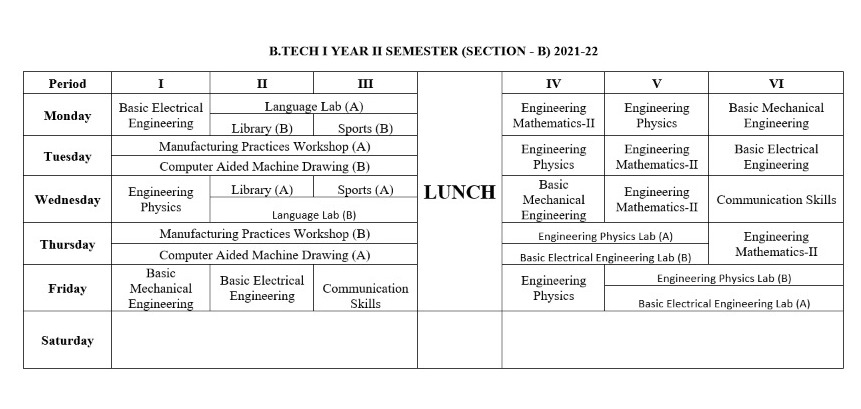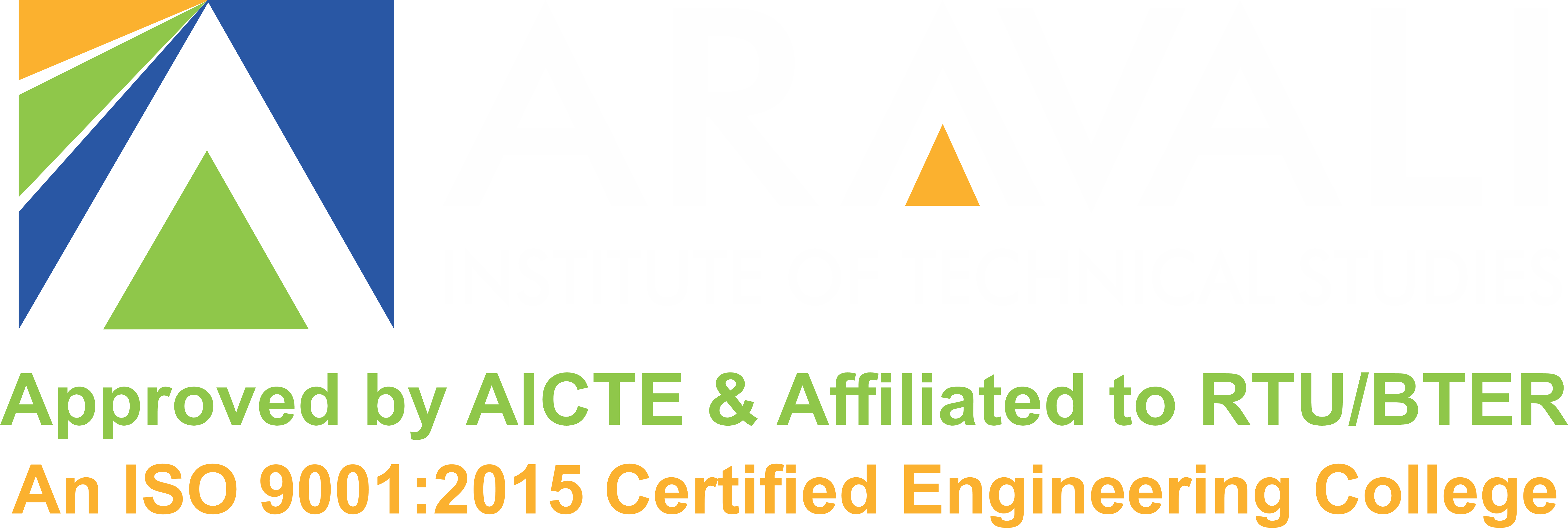Basic Science Department
(B.Tech. / M.tech.)
- About Department
- Faculty
- Event
- Achievement
- Time Table
- Laboratries
- Course File
- Placements
- Publication
About Basic Science Department
Department of Basic Science and Humanities was established in the year 2008.This Department is devoted to foster the fundamental principles and understanding of science to enhance the student’s basic knowledge of Engineering. Its objective is to provide value-based education to budding scientists and engineers. Engineering as a stream of study demands the basic knowledge of Physics, Chemistry, Mathematics and ignoring these streams can never make a perfect engineer. The English Language Lab through communication and soft skills training enables students to prepare for life, in a globally competitive environment. Therefore, the department acts as an active catalyst to develop perfect approach to unlock their hidden talent, personality and communication skills to fulfill the needs of young engineers.
Extracting and disseminating vital information forms the essential tenet of engineering education which the department ensures by taking special care for improving communication skills in the English language. The department currently comprises well qualified faculty members, organized into four units along broad disciplinary lines – Chemistry, English, Mathematics and Physics. The department transforms the technical into the creative through its engagement with various productive clubs like Eco Friends Club, Science & Technology Club, Spiritual Club, Toastmasters Club, Docu-Drama Club and many more.
Vision
- We give them wings and they rule over the sky.
- Our vision is “To Provide Education in Engineering with excellence and ethics and to reach the unreached”.
- To transform the institute into a global center of learning through the synergic application of creativity, innovation and discipline.
Mission
- To provide value based education and mould the character of the younger generation through a system of wholesome learning, so that their nearest endeavor to achieve progress and prosperity in life is matched by an ardent desire to extend selfless service to society, one complementing the other.
- Today we are working endlessly, ceaselessly & Creatively to expand the horizons of wisdom to build a significantly better ‘Tomorrow’ to attain the highest level of fulfillment.
Programme Outcomes (POs):
- Engineering knowledge:Apply the knowledge of mathematics, science, engineering fundamentals, and an engineering specialization to the solution of complex engineering problems.
- Problem analysis:Identify, formulate, review research literature, and analyze complex engineering problems reaching substantiated conclusions using first principles of mathematics, natural sciences, and engineering sciences.
- Design/development of solutions:Design solutions for complex engineering problems and design system components or processes that meet the specified needs with appropriate consideration for the public health and safety, and the cultural, societal, and environmental considerations.
- Conduct investigations of complex problems:Use research-based knowledge and research methods including design of experiments, analysis and interpretation of data, and synthesis of the information to provide valid conclusions.
- Modern tool usage:Create, select, and apply appropriate techniques, resources, and modern engineering and IT tools including prediction and modelling to complex engineering activities with an understanding of the limitations.
- The engineer and society:Apply reasoning informed by the contextual knowledge to assess societal, health, safety, legal and cultural issues and the consequent responsibilities relevant to the professional engineering practice.
- Environment and sustainability:Understand the impact of the professional engineering solutions in societal and environmental contexts, and demonstrate the knowledge of, and need for sustainable development.
- Ethics: Apply ethical principles and commit to professional ethics and responsibilities and norms of the engineering practice.
- Individual and team work:Function effectively as an individual, and as a member or leader in diverse teams, and in multidisciplinary settings.
- Communication: Communicate effectively on complex engineering activities with the engineering community and with society at large, such as, being able to comprehend and write effective reports and design documentation, make effective presentations, and give and receive clear instructions.
- Project management and finance: Demonstrate knowledge and understanding of the engineering and management principles and apply these to one’s own work, as a member and leader in a team, to manage projects and in multidisciplinary environments.
- Life-long learning:Recognize the need for, and have the preparation and ability to engage in independent and life-long learning in the broadest context of technological change.
Message from HOD
The Department of Humanities and Science has sub-departments like Mathematics, Physics, Chemistry and Humanities (English, Universal Human Values). The H&S department plays an important role in teaching basic science courses prescribed by the RTU Kota in the first, second and third years of B.Tech. The Department enhances basic knowledge in subjects like Engineering Mathematics, Engineering Physics, Engineering Chemistry, Human Values and Communication. Highly Qualified and Experienced Faculty Members are the backbone of this department. All have more than 10 year of teaching experience. Department faculty members have significantly published many research articles in reputed national & international journals, conferences, workshops, seminars and also participated in various FDP/STTPs. First year departments also have responsibility to provide career enhancement skills training to first year to final year students.


Chemistry Lab
The strength of the Department of Chemistry has been and continues to be at itsfor excellence in research and teaching. The faculty of the department is well qualified, and motivated with a strong commitment towards teaching,research and mentoring. The commitment towards research is reflected in the research paper publications in reputed national and international journals as well as presentations of research papers in national and international conferences/seminars.The department is well equipped to undertake projects sponsored by the Ministry of Human Resources and Development, Department of Science and Technology, and Council of Scientific and Industrial Research. The department also encourages link with industry sponsored research. The faculty has been active in organizing scientific meetings from time to time. Department offers a vibrant and dynamic atmosphere to nurture the spirit of inquisitiveness amongst students and faculty members.
The department offers laboratory and theory core courses covering basic concepts in various sub-disciplines of Engineering Chemistry and Environmental Engineering. Besides these, the department also routinely runs Chemistry minor and preparatory programmes.
Physics Lab
Department of Physics is enriched with experience and committed for overall quality enhancement of students. The Department of Physics have highly qualified, dedicated and sincere faculty members. Five faculty members are doctorate holders and the other three faculty members are pursuing for their Ph.D. degree. Faculty members motivate students to learn the complex concepts with the help of hands on experimentation. Department have two well-equipped and spacious laboratories for doing experimentation at B. Tech. level. Engineering Physics labs are broadly divided into two segments. One is the Dark Room for experiments related with optics and the second is General Lab for electronics and electrical experiments. There are more than twenty experiments with multiple apparatus in the lab so that each student can have an individual experiment set up. The lab is very spacious and designed in such a way that more than thirty five students can perform their experiments simultaneously. The experiments are designed in such a manner so that student can understand the concept and working principle of those. There is also a departmental library containing more than a hundred reference as well as text books. The faculties are actively engaged in research activities. Some of the research areas of interest are Microstrip Patch Antenna, Material Science and Nanotechnology etc.
Robotics Lab
The Robotics Lab provides space and infrastructure for research and development for enhanced systems ultimately impacting manufacturing, agriculture, elder assistance, home automation, vehicle automation, and more.
Recent advances in machine learning – personal robots, automatic cars, and even brain-controlled prostheses – have set the stage for robotics to make real and meaningful advances to our quality of life. The Robotics Lab provides space and infrastructure for research and development for enhanced systems ultimately impacting manufacturing, agriculture, elder assistance, home automation, vehicle automation, and more. Located in Richard Weeks Hall of Engineering, the lab is a multi-disciplinary space that provides students and faculty a dedicated space for collaboration and innovation.

